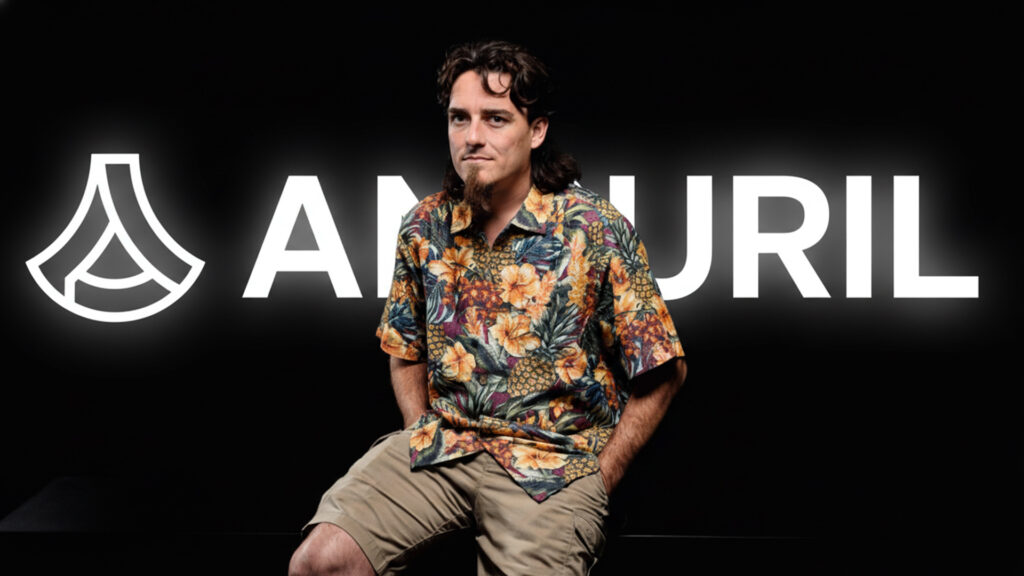Anduril – How Palmer Luckey’s Defense Startup Weaponized Speed

At 24, Palmer Luckey was cast out of Silicon Valley.
After selling his VR company Oculus to Facebook for $2 billion, he was unceremoniously fired, becoming a pariah in the world of consumer tech. His offense? Political donations that made him persona non grata in a hyper-liberal ecosystem.
Most ousted founders would retreat. Or angel invest. Or write a book.
Palmer Luckey decided to build a weapons company.
And in doing so, he launched a full-scale insurgency against the most powerful and slow-moving industry on the planet: the military-industrial complex. The company is Anduril, and its story is a masterclass in how to weaponize speed.

The Founder’s Doctrine: A War on Bureaucracy, Built from Exile
Luckey, a self-described gamer and hacker, wasn’t just driven by ambition. His decision to enter national security was deeply strategic: “I knew I could have a big impact, I knew it was a set of important problems, and then actually the unpopularity of it was one of the reasons I knew I had to work on it.”
He realized his newfound “unpopularity” in tech gave him a unique freedom: “I was somebody who didn’t have to keep the tech industry happy anymore. Everyone already hated me.”
He diagnosed the core weakness of American defense with brutal clarity:
“The Pentagon doesn’t have a technology problem. It has a speed problem.”
The legacy contractors—Lockheed, Raytheon, Northrop—had become masters of bureaucracy, not innovation. They moved at the speed of government proposals, measuring progress in decades.
Anduril was built to move at the speed of software. Their doctrine was simple and heretical: build first, sell later. Instead of waiting for a formal request, Anduril uses its own venture capital to innovate proactively. It ships ready-to-deploy prototypes—drones, surveillance towers, AI command systems—and lets the government test them in the field.
“We want to be a product company, not a contractor,” Luckey states. Contractors get paid for work, even if the outcome is slow or suboptimal. A product company, by contrast, “spends its own money building products and then sells them to a customer. And if you can’t make your product work, nobody’s going to buy it. If it’s not better than the competition, nobody’s going to buy it.”
This shifts the risk and rewards to where they belong.
The Arsenal: Software-Defined Warfare & A Geopolitical Counter-Punch
While the titans of defense were building bigger, more expensive hardware, Anduril focused on the brain. Their strategy isn’t about building a better missile; it’s about building a smarter network.
- The Crown Jewel: Lattice OS. This is Anduril’s real moat. It’s an AI-powered operating system that fuses data from every sensor, drone, and vehicle into a single, real-time battlefield view. The hardware is just a vessel; the software is the weapon.
- Venture-Fueled R&D: Anduril’s nearly $2 billion in venture funding allows them to innovate proactively, building next-generation technology years before a formal procurement process even begins.
Luckey also recognized a deeper, more insidious threat: China’s pervasive influence. He observed how the tech industry had become “hugely dependent on China”, to the point where, as he provocatively put it, “you can say you’re a man, you’re a man, if you say you’re a woman, you’re a woman, but there’s one thing you can’t say you are, and that’s Taiwanese”. This dependence created a national security vulnerability: “It’s wild that all of the terminals that are used to command and control our weapon systems… are built on top of Chinese components”.

Anduril’s existence is, in part, a counter-punch to this strategic capture. It’s about reshoring innovation and building a domestic, autonomous defense capability.
In just a few years, this insurgency has yielded a $14 billion valuation and major contracts with the U.S. Department of Defense, U.K. Ministry of Defence, and Australian Defence Force.
Founder Lessons from the Battlefield
- Weaponize Your Tempo. In an industry of giants, your greatest asymmetric advantage is the ability to decide, build, and deploy faster than they can schedule a meeting. Speed is a weapon.
- Build the Demo, Not the Deck. “A functional prototype is more persuasive than any PowerPoint.” Anduril shows working technology, bypassing archaic proposal processes.
- Attack the Process, Not Just the Product. Anduril’s true disruption wasn’t a new drone; it was a new business model that made the archaic defense procurement process irrelevant by becoming a product company, not a contractor.
- A Contrarian Founder is a Strategic Asset. Luckey’s outsider status, forged by his Silicon Valley exile, freed him to challenge the unwritten rules of an industry he never belonged to. Don’t fear being unpopular if it aligns with impact.
- See the Unseen Threats. Luckey identified China’s strategic capture of tech and manufacturing long before it became mainstream. The deepest insights come from observing uncomfortable truths.
Final Word
Anduril is rewriting the rules of an industry long thought to be immune to disruption. Palmer Luckey’s rebellion is proving that a small, agile team with a clear vision and the freedom to execute can outmaneuver even the most entrenched incumbents.
He’s proving that in war (as in business), the greatest weapon isn’t firepower.
It’s speed.